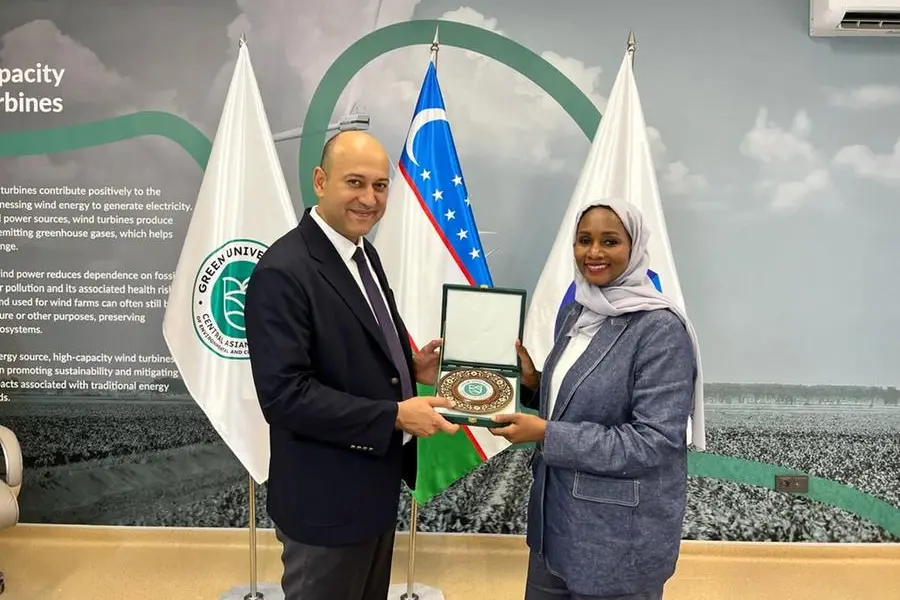PHOTO
- The collaboration aims to focus on agricultural research, capacity development, and sustainability, among other things.
Tashkent, Uzbekistan - The International Center for Biosaline Agriculture (ICBA) has formalized its collaboration with the Central Asian University of Environmental and Climate Change Studies, also known as Green University, by signing a memorandum of understanding.
The agreement was signed by Dr. Tarifa Alzaabi, Director General of ICBA, and Dr. Jasur Salikhov, Acting Rector of Green University, during a ceremony in Tashkent, Uzbekistan. The signing ceremony was attended by H.E. Mohammad AlDaheri, Head of Economic, Political, and Media Affairs Section at the Embassy of the UAE in Tashkent, Uzbekistan.
It paves the way for closer cooperation in advancing agricultural research and development in Uzbekistan. The collaboration will cover such areas as joint projects and programs designed to enhance agricultural science and innovation and capacity development. In particular, it will provide internship and fellowship opportunities to students from Green University to gain valuable hands-on experience. Moreover, the agreement outlines plans for organizing workshops, conferences, webinars, and other events to promote knowledge exchange and agricultural science.
As part of this partnership, special attention will be paid to the empowerment of women in agriculture by developing their research and leadership skills. Both institutions will also seek funding for joint projects and will actively exchange scientific materials, publications, and other relevant information to support their collaborative efforts.
Dr. Tarifa Alzaabi, Director General of ICBA, said: “Our collaboration with Green University will make it possible to combine our resources and efforts to achieve common goals in sustainable development in Uzbekistan in particular and Central Asia as a whole. By leveraging our capacity and expertise, we will work to address critical challenges in agriculture and contribute to food security, livelihoods and sustainability at the national and regional levels. We look forward to putting our plans into action and developing innovative solutions for sustainable agrifood systems, especially in saline and arid environments.”
Dr. Jasur Salikhov said: “Green University is pleased to announce a new strategic partnership with ICBA. Our collaboration aims to create a more resilient and sustainable future for food systems and local communities in Uzbekistan through joint scientific research, the development of innovative agricultural practices, capacity building, and youth empowerment initiatives.”
Dr. Charbel Tarraf, Chief Operations and Development at ICBA, said: “As we give youth engagement a priority in our capacity development programs, we work closely with academic institutions in different countries. We believe it is important to provide young people with resources and opportunities to engage in scientific research and innovation. Therefore, we offer a wide range of tailor-made programs to students, including internships and fellowships. And this partnership will allow students from Green University to benefit ICBA's capacity development offerings.”
The partnership with Green University builds on ICBA’s existing portfolio of initiatives and collaborations to support sustainable agricultural development in Uzbekistan and the wider region. In early 2024, ICBA’s management held a series of meetings with senior government officials and other partners in Uzbekistan to discuss expanding cooperation in various fields. These efforts form part of ICBA’s broader goal to build strategic alliances and partnerships around the world to foster sustainable agriculture, food security, and livelihoods.
-Ends-
About ICBA
Established by the Government of the United Arab Emirates and the Islamic Development Bank, the International Center for Biosaline Agriculture (ICBA) is a unique international not-for-profit applied research-for-development center. The center’s approach integrates strategic alliances, technical expertise, and knowledge empowerment to co-create innovative solutions for sustainable livelihoods and food security in saline and arid environments. The center’s research is at the nexus of soil, water, crops, and climate to prevent, manage and recover from salinity in agricultural lands. Through this holistic and integrated approach, ICBA strives to make a lasting positive impact on the lives and livelihoods of farming communities, ensuring their resilience and contributing to a more sustainable future for all. www.biosaline.org




















